In this article, we will explore the critical steps and considerations involved in heat pump replacement. With the right information and guidance, navigating this process can be seamless and cost-effective.
How to Determine If Your Heat Pump Needs Replacement
Signs of a Failing Heat Pump
When your heat pump starts showing inconsistent heating or cooling, it might be nearing the end of its lifespan. Unusual noises and frequent cycling are also common indicators of a failing heat pump.
If your energy bills are rising without a change in utility rates, your heat pump might be working harder than necessary. This could be due to reduced efficiency, often the result of wear and tear over time.
Additionally, the age of your heat pump is a significant factor; most units last about 10 to 15 years. If yours is within or beyond this range, replacement might be more economical than repair.
Evaluating Repair vs. Replacement
Assessing whether to repair or replace involves weighing the cost of repairs against the price of a new unit. If repair costs are more than half the price of a new heat pump, replacement is likely the better option.
Consider how often you’ve needed repairs recently. Frequent repairs can add up, making replacement a more feasible long-term financial decision.
It’s also important to evaluate how efficiently your heat pump operates after repairs. Continuing issues even after fixes can signal that replacement will eventually become necessary.
What to Consider When Choosing a New Heat Pump
Energy Efficiency Ratings
Energy efficiency is crucial in selecting a new heat pump, as higher efficiency often translates to lower operating costs. Look for heat pumps with high SEER and HSPF ratings for optimal performance.
These ratings indicate how effectively a heat pump cools and heats, respectively, and inform potential savings on energy bills. Investing in an efficient model can significantly reduce long-term expenses.
Moreover, opting for an ENERGY STAR-rated system ensures that the unit meets strict energy efficiency guidelines set by the U.S. Environmental Protection Agency. Such units help lower your carbon footprint.
Type of Heat Pump Best Suited for Your Home
Different heat pumps offer various advantages depending on your climate and home setup. Air-source heat pumps are popular due to their affordability and efficiency in moderate climates.
However, if you face extreme temperatures, a geothermal heat pump might be more efficient as it uses the Earth’s consistent underground temperature for heating and cooling. Though more costly upfront, it can offer substantial savings over time.
Consider your home’s insulation and window efficiency since a well-insulated home can maximize a heat pump’s efficacy. Working with a professional can help identify which system is most suitable for your needs.
Cost of Heat Pump Replacement and Budgeting
Understanding the Total Cost
Replacing a heat pump involves various costs, including the price of the unit, installation fees, and potential modifications to existing ductwork. Understanding these components is essential to budget accurately.
Labor charges can vary significantly; therefore, obtaining multiple quotes from trusted HVAC professionals can ensure a competitive rate. Total replacement costs typically range from $4,000 to $10,000.
Remember that while upfront costs can be steep, modern heat pumps offer greater energy savings over time, leading to eventual recoupment of the initial investment. Knowledge of these costs helps in better financial planning.
Financing and Incentives
Fortunately, numerous financing options and incentives can make replacing a heat pump more affordable. Many manufacturers and installers offer financing plans to ease the upfront burden.
Government incentives and rebates may also be available at both the federal and state levels for installing energy-efficient models. These can significantly lower the financial barrier to installing a new system.
Researching these options in advance allows you to maximize potential savings and tackle the replacement cost in a financially sound manner. Consulting with a financial advisor or HVAC specialist can offer guidance on the best available options.
How to Find a Reliable Heat Pump Installer
Research and Qualifications
Finding a reliable installer starts with researching their qualifications and experience levels. Ensure that prospective installers have the necessary licensure and certifications for your region.
Experienced contractors often provide better service, leveraging their knowledge to handle installation nuances effectively. A skilled installer can greatly influence the longevity and efficiency of your new heat pump.
Engage with professionals who stay updated with industry standards and innovations. This commitment to learning ensures they offer modern solutions for heat pump installations.
Checking Reviews and Testimonials
Customer reviews and testimonials are invaluable resources when selecting an installer. They provide feedback on the installer’s reliability, work quality, and customer service satisfaction.
Look for patterns within feedback, such as consistent praise or complaints, to gauge an installer’s track record. This approach helps avoid potential issues and ensures peace of mind with your choice.
Personal recommendations from friends or family can also guide you toward trustworthy professionals. A local reputation for excellence is often a good sign of a reliable installer.
Maintaining Your New Heat Pump
Regular Maintenance Practices
Regular maintenance is crucial to ensuring your heat pump operates efficiently throughout its lifespan. Simple tasks like changing air filters and keeping the unit clear of debris can prevent performance issues.
Cleaning coils and ensuring proper airflow can further optimize your system’s efficiency. Addressing small maintenance tasks can lead to significant savings by reducing wear and tear.
Scheduling Professional Services
In addition to self-maintenance, scheduling regular professional check-ups is vital to sustain your heat pump’s efficiency. Professional inspections can catch potential problems early before they necessitate costly repairs.
Experts recommend biannual professional maintenance, ideally before seasonal shifts, to prepare your system for increased use. Prioritizing these services ensures your heat pump is in peak condition year-round.

